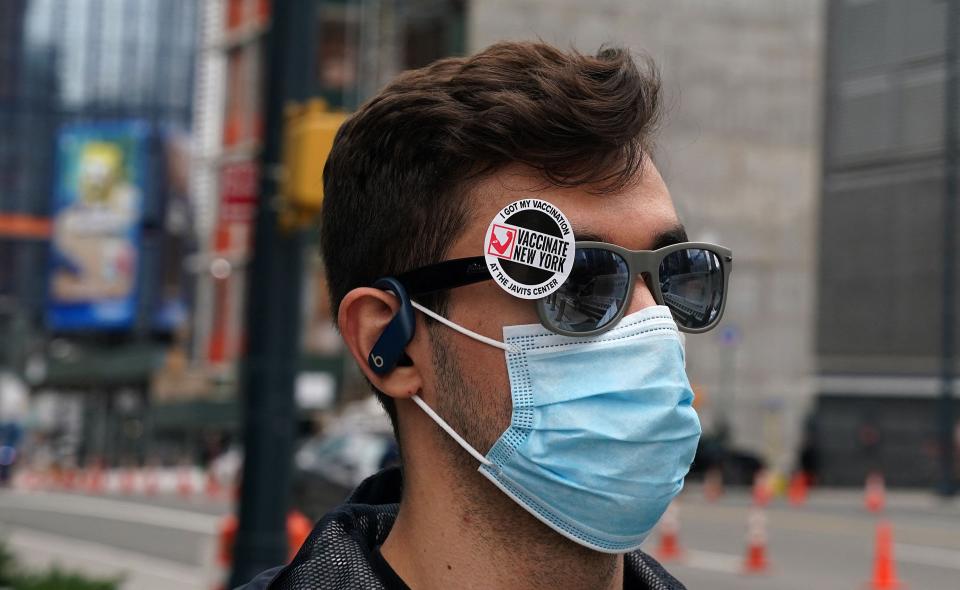Why the Johnson & Johnson news feels so bad
The Food and Drug Administration is warning about a possible link between the Johnson & Johnson vaccine and the autoimmune disorder known as Guillain-Barré syndrome, saying the data "suggests an association” between the vaccine and a higher risk of the condition but not enough "to establish a causal relationship.”
Use of the Johnson & Johnson vaccine, the only single-dose shot for COVID-19, which has been administered to nearly 13 million people in the U.S., was also paused in April so federal health officials could review data involving six reported cases of a rare and severe type of blood clot, though it was determined the vaccine's benefits outweighed its risks.

While the latest J&J news may contribute to hesitancy among those who remain skeptical of the COVID-19 vaccines, experts say this is exactly how science progresses.
"For those of us who pay attention to science and have for most of our lives, we can appreciate the fact that science is not linear. What we learn evolves," said Lynn Bufka, senior director for practice transformation and quality at the American Psychological Association. "But because as a world, we have really been focused on vaccination as perhaps a ticket, if not the ticket, towards returning to a life that approaches more of what we'd like to be doing more comfortably and freely, now we are reconciling all the hopes we pinned on the vaccine with the reality of how science works."
Experts: 'Don't panic' over Johnson & Johnson vaccine pause
Coping with continued uncertainty, and managing anxiety
Uncertainty has been a defining feature of COVID, but more recently, especially as vaccinations increased, there was a feeling that we better understood the path forward than ever before. While health experts cautioned we weren't in the clear, it seemed we were closer than ever to ending a pandemic that cost over 600,000 American lives.
The J&J news adds to uncertainty at a time when our tolerance for uncertainty feels exhausted. It is another disruption in the largely positive vaccine narrative.
Q&A: What do I do if I've gotten the Johnson & Johnson COVID-19 shot? Your questions, answered
Bufka said to manage anxiety, it can be helpful for people to remind themselves that they continue to make the best decisions with the information available.
"We make decisions like this all the time," she said. "We choose to drive somewhere. There are risks associated with being in a car, but most of us don't worry about that on a daily basis, because we've accepted those risks as part of the price of getting where we want to go."
'My heart dropped': Fears about increased vaccine hesitancy
Some health experts worried the last J&J pause would fuel vaccine hesitancy. Many people already tend to underestimate the risks of infection and overestimate the risks of vaccines.
"My heart dropped because it's not good in any way," Jay Van Bavel, an associate professor of psychology and neural science at New York University who has studied vaccine hesitancy, said in April when J&J was temporarily paused.
Van Bavel wondered if this might be that one rare instance, in the middle of a pandemic, when pausing may cause more harm than good.
"The rules we have defined might not be well-designed for this particular situation," he said.
A Kaiser Family Foundation poll found 9% of unvaccinated adults said the pause made them less likely to want the Johnson & Johnson vaccine and 7% said it made them less likely to want any of the vaccines.
Jennifer Reich, a sociology professor at the University of Colorado Denver whose research focuses on how people make decisions about vaccines, said the pause is verification that vaccine systems work well and gives the FDA an opportunity to make sure "vaccines remain exquisitely safe."
Even with a highly powered clinical trial, she said, you can only learn so much with 30,000 participants.
'A really rare event'
When the J&J vaccine paused in April, Anthony Fauci, the nation’s leading infectious disease expert, said it was important to keep it in perspective.
“This is a really rare event … It’s six out of the 6.85 million doses, which is less than one in a million,” Fauci said during a White House briefing.
The CDC said in a statement Monday that the risk of severe side effects from any of the COVID-19 vaccines remains rare.
Analysis: Comparing the COVID-19 vaccines
"The ability to sit with uncertainty and to recognize that we still have choices we can make and still have control over most of our lives is important," Bufka said. "That will help us with all the rest of the curveballs that are going to come at us, whether they're COVID-related or not."
This article originally appeared on USA TODAY: COVID vaccines: Johnson & Johnson news causes anxiety. How to cope.

